Lesson planning
专题六 lesson planning

专题六Lesson planningIn this unit, we have learnt one of the most important components of language teacher's work, lesson planning. We have focused on the following topics:1. What is lesson planning?2. Why is lesson planning important? (语言教学设计的重要性)3. What are principles for good lesson planning?4. What are macro planning and micro planning?5. What are the components of lesson plan?6.How to begin、develop and finish a class in the process of teaching activities?一.What 备课的概念与内涵A lesson plan is a framework of a lesson in which teachers make advance decisions about what they hope to achieve and how they would like to achieve it. In other words, teachers need to think about the aims to be achieved, materials to be covered, activities to be organized, and techniques and resources to be used in order to achieve the aims of the lesson.※The difference between lesson plan and lesson planning动态概念静态概念Lesson planning lesson plana process of planning a final planning productKey words: aims, materials, contents, activities, method and strategyIn summary, proper lesson planning is essential for both novice and experienced teachers.教案,即教学过程的具体规划,教学内容和课堂活动的具体安排。
6. Lesson planning

备课
Lesson planning
Lesson planning begins with THINKING…
备课
备课 从思考开始……
Why do we plan lessons?
•to ensure that our teaching is matched to specific learning objectives •to help us manage our time during each lesson •so we know what to teach when in the classroom •to know what we have taught when we consider a series of lessons备课 Nhomakorabea1.
2.
3.
4. 5. 6. 7. 8. 9. 10.
自由型练习(给予纠正性的反馈意见): 单个练习、结对练习、小组练习 新学习内容的介绍(示范、讨论、解释说 明等) 学习成果展示(角色扮演、问答、哑剧 等) 复习上节课的学习内容来评估学生的学习 常规内容(学生人数,年级,主题等) 学习目标(通过海报或黑板展示) 回顾总结(回顾本节课学习内容) 热身活动(故事、游戏等) 控制型学生练习 把握时间
Kinaesthetic
学习风格
常用的3种学习风格是通过:
听觉
视觉
触觉
Remember: You teach students with a variety of learning styles, so it’s good to change the style of learning to accommodate all learners.
Unit-4-Lesson-Planning教学内容
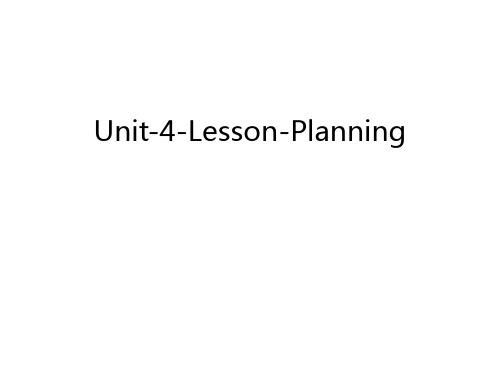
aims, objectives
How to achieve:
materials, activities, techniques, resources, etc.
Discussion
How do you judge whether your teacher is prepared or not?
4.2 Principles for Good Lesson
Planning
1. Aim: the realistic goals for the lesson; what students are able to do by the end of the lesson;
2. Variety: different types of activities; a wide selection of materials;
Before the lesson ????
After the lesson ????
Before the lesson
aims contents teaching aids activities techniques time potential problems
After the lesson
Unit-4-Lesson-Planning
4.1 Importance of Lesson Planning备课
Q: What is a lesson plan? (教案) What is planned for the lesson?
“A lesson plan is a framework of a lesson in which teachers make advance decisions about what they hope to achieve and how they would like to achieve it.”(51)
unit 6.1 lesson planning

2) Human factors
a.Different personalities of teachers decide different styles of teaching. b.Varied needs and attitudes of students make teachers readjusts the teaching plan. c.The students present level makes teachers readjust the objectives. d. The students’ language learning background influence the choice of teaching techniques and even that of lesson objectives.
--- a particular topic --- a structure --- a function --- a skill or skills What will the students be able to do at the end that they are not be able to do at the beginning? That is your objective.
II. Factors influencing a Lesson Plan
Brainstorm some of the factors influencing a
lesson plan( group work )
1) Physical conditions 2) Human factors 3) NEC & testing
What the teaching aims should be like?
英语教学法-lesson planning课件

The contents and tasks planned should be within the learning capability of the students. Doing things that are beyond or below the students’ coping ability will diminish their motivation (Schumann, 1999)
a job on a piece of paper, and the others guess by asking questions. Teacher
demonstrates first.
b) Use PPT to show some celebrities and ask students to name their jobs. Such as
time duration for each stage is necessary and helpful
Stages and procedures:
➢ stages :the major chunks of activities ➢ Procedures: the detailed steps in each
by the end of the lesson.
Teaching aims:
➢ Contents: structures (grammar), vocabulary, functions, topics etc.
➢ Skills: listening, speaking, reading and writing.
Aim
The realistic goals for the lesson; what students are able to do
unit 4 Lesson Planning
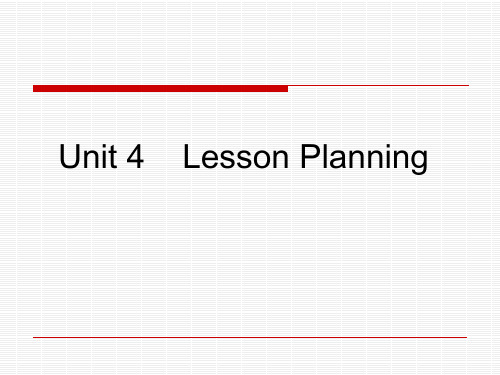
Task 4 in p57
Study the contents carefully and write a few objectives for the lesson
language contents and skills : task 5 in p58 Know exactly what language contents will be taught (structures, vocabulary, functions, topics ), and what language skills will be practiced in the lesson( communicative skills such as 4 skills). How to deal with new vocabularies and new structures?
Learnability : the contents and tasks planned for the lesson should be within the learning capability of the students Linkage : the stages and the steps within each stage are planned in such a way that they are somehow linked with one another. Language learning needs recycling and reinforcement.
Teaching stages and procedures
Detailed steps in each teaching stage. Warm-up exercises/ a starter Its functions, methods and principles
(完整版)《英语教学法》Unit_4_Lesson_Planning
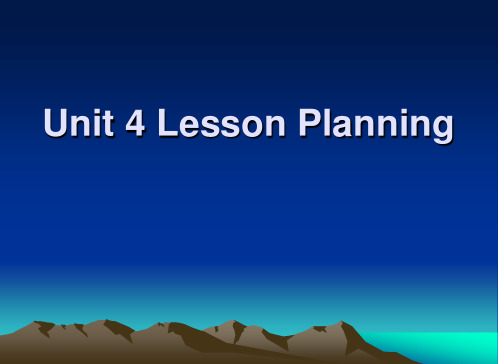
• Language teachers benefit from lesson planning in :
lesson planning?p.52-53 • What types of lessons do you know?
• Lesson planning means making decisions in advance about what techniques, activities and materials will be used in the class.
• ● Size of classroom: restricts some types of
activities
• ● Teaching aids: sufficient or not • ● Time of day: influences the types of
activities used (p.m. or a.m.)
• Procedures are the detailed steps in each teaching stage.
What teaching model is the easiest procedure to teach a new
structure-based lesson?
• PPP model, which includes presentation, practice and production.
4.lesson planning

Unit 4 Lesson Planning
• I.Why is lesson planning necessary?
Advantages of planning a lesson
make the teacher aware of the aims and contents.
distinguish various stages of a lesson and see the relationships between them.
• Design a lesson plan for the text.
IV. Lesson Planning & the Curriculum
• • • • • • Learner-centredness Competence TBLT Formative assessment Independent learning ability Resources
Main Aspects of a Lesson Plan
1.Background information 2.Teaching objectives nguage contents and skills 4.Teaching methods 5.Teaching aids 6. Teaching process 7. Assignments & optional activities 8. after lesson reflection
英语说课的意义
1.将英语教师对英语教材、教法和学法的 • 理解由个体活动转化为群体活动
陈 述 和 交 流
2.更有利于英语教师对教学过程的反思和 调整
调 整
3.提升英语教师的教学水平和教研水平
unit 4Lesson Planning
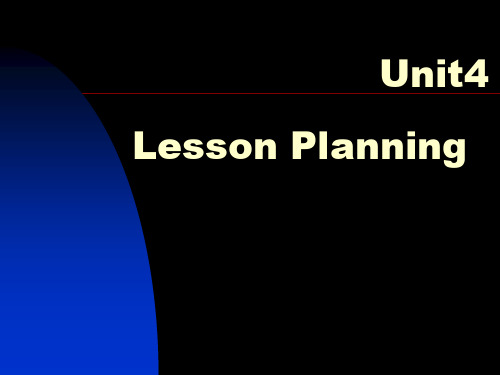
Too general to be qualified as a specific lesson objective
Behavioral verbs
a to z
Analyze, apply, arrange Build Categorize, choose, classify, compare Deduce(推论), define, demonstrate Estimate, evaluate, explain Generate, graph Identify, indicate Label, locate
2 Teaching aims and demands 3 Knowledge Affect Skill 4 Teaching purpose
5 Knowledge aims Ability aims Moral education aims
Practice
Task 3 (p56)
Sample 1
pronunciation role-play writing Topic of the lesson Cross-curricular activities arts maths
Activities matching
sequencing pictures listen and joining in Resources needed Learning outcomes pictures tape recorder wallpaper word worksheets cards role-play a survey telling a story
Sample 3
Original version:Help students learn to read science writing and know about scientists and their work Revised version: Through reading and explanation (C), students (A) will be able to summarize the main contents of the passage (B), orally/in writing (C), from memory (C).
Unit-7-Lesson-Planning
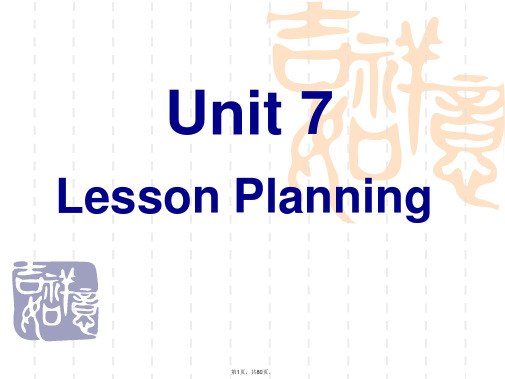
4. Learning strategies
(1) The students will be able to guess and reason the presumption by the information collected from the reading of the invitation.
in a proper way.
(3) The students will be aware of the word choices used among good friends.
力发展出发? (3)教学目标是否合理、可行,并具有可检
测性? (4)教学目标是写出来应付差事的,还是为
自己的教学服务的?
第19页,共80页。
教学目标的编写
1、对象(Audience)的表述,也就是解决“由谁来完成行为”的 问题,可以采用三种方法表述:
(1)程度副词+主语:如程度较好的学生、程度稍差
2. What can teachers benefit from lesson planning? (P. 52)
3. What are principles for good lesson planning ? ( P. 53~54 )
第3页,共80页。
备课的内容
1.备课标: 教师在授课以前必须认真学习、钻研课标。
Unit 7
Lesson ing
第1页,共80页。
备课的定义
▪ 广义的备课是对整个学期、学年、学程的教
学的所有教学准备;
▪ 狭义的备课是指教师钻研课标、教材,了
解学生的思想实际和学习实际,选择教学方 法,安排教学进度和编写教案的全过程。
lessonplan的八大要素
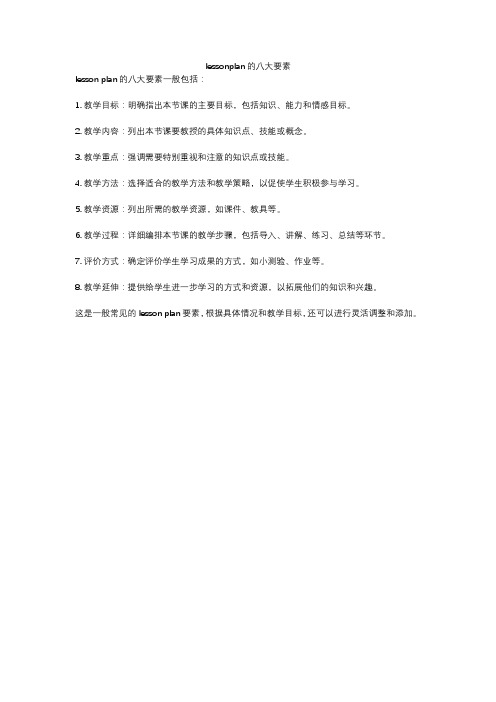
lessonplan的八大要素
lesson plan的八大要素一般包括:
1. 教学目标:明确指出本节课的主要目标,包括知识、能力和情感目标。
2. 教学内容:列出本节课要教授的具体知识点、技能或概念。
3. 教学重点:强调需要特别重视和注意的知识点或技能。
4. 教学方法:选择适合的教学方法和教学策略,以促使学生积极参与学习。
5. 教学资源:列出所需的教学资源,如课件、教具等。
6. 教学过程:详细编排本节课的教学步骤,包括导入、讲解、练习、总结等环节。
7. 评价方式:确定评价学生学习成果的方式,如小测验、作业等。
8. 教学延伸:提供给学生进一步学习的方式和资源,以拓展他们的知识和兴趣。
这是一般常见的lesson plan要素,根据具体情况和教学目标,还可以进行灵活调整和添加。
chapter_9_Lesson_Planning

6) Lesson planning is a good practice and a sign of professionalism.
案例一
PEP BOOK3 Unit Two ( P从ar教t B师: L的et’角s ta度lk)出发,“使学生…” “发
展学生的…” “训练学生的…” “培养学
Teaching aims: 1. Aims on the
knowled生ge 的…”,目标主体均为教师
(1) To enable the children to grasp the usage of the single and
1) Aim: the realistic goals for the lesson.
2) Variety: planning a number of different types of activities and where possible, introducing students to a wide selection of materials so that learning is always interesting, motivating and never monotonous for the students.
It may involves the aims, materials, activities, techniques and resources.
2. The Importance of Lesson Planning
Teaching is a dynamic activities performed in and out of class, so a well-prepared lesson plan can aid language teachers in a number of the following ways:
Unit-4-Lesson-PlanningPPT课件
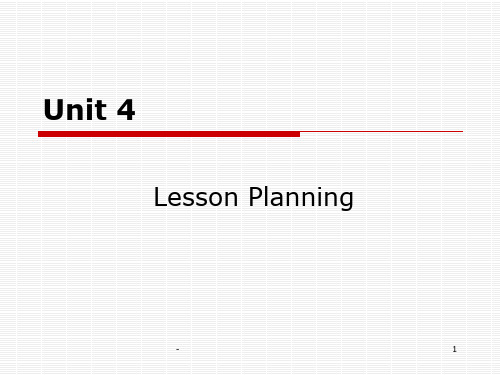
It is a presentation of the aims and contents of a lesson.
It guides, reminds an at-a-glance check both before and during a class.
It can be used to evaluate what has happened in class.
5. Linkage: the stages and the steps within each stage are linked with one another.
-
15
A plan is just a plan.
Things often do not happen according to our plan no matter how experienced we are.
Before the lesson ????
After the lesson ????
-
11
Before the lesson
aims contents teaching aids activities techniques time potential problems
-
12
After the lesson
Principles, purposes, requirements, targets specified, methodological suggestions, assessment requirement, etc.
5. Knowing about the textbook
Philosophy of teaching, organization of learning contents, major topics, ways of assessment, etc.
Unit-4--Lesson-Planning2
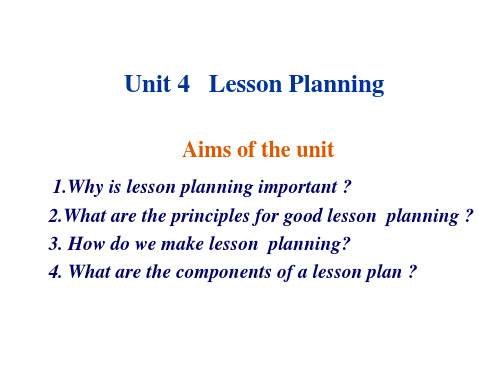
Macro planning
— is planning over a long period of time. This is
often done at the beginning of the term by a group of teachers.
There are five major principles behind good lesson planning . aim variety flexibility learnability linkage
Aim
The teacher should have a clear idea of what he /she would like to achieve for the lesson or what outcomes are expected from the lesson.
3. What can language teachers benefit from a proper lesson planning ?
4. What should teachers do after the class ?
1. What is lesson planning ?
Lesson planning is a general guidance for teachers to follow in the class. It means before the lesson, teachers should make a decision in advance about — what aims will be achieved; — what techniques, activities and materials will be used in the class.
Lesson Planning 上课准备工作
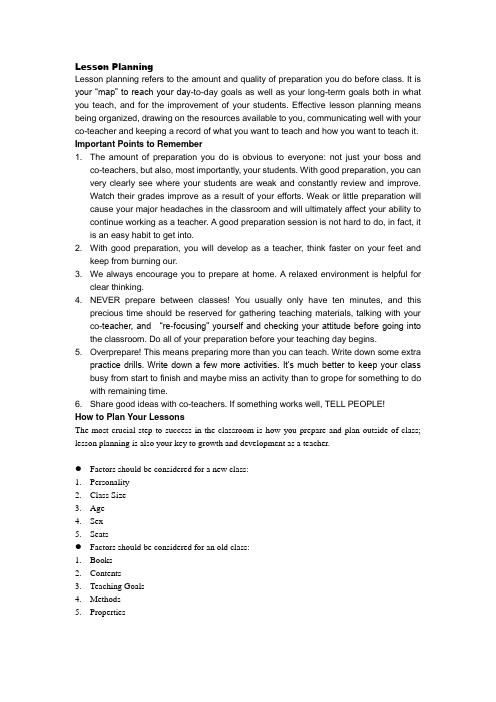
Lesson PlanningLesson planning refers to the amount and quality of preparation you do before class. It is your “map” to reach your day-to-day goals as well as your long-term goals both in what you teach, and for the improvement of your students. Effective lesson planning means being organized, drawing on the resources available to you, communicating well with your co-teacher and keeping a record of what you want to teach and how you want to teach it. Important Points to Remember1. The amount of preparation you do is obvious to everyone: not just your boss andco-teachers, but also, most importantly, your students. With good preparation, you can very clearly see where your students are weak and constantly review and improve.Watch their grades improve as a result of your efforts. Weak or little preparation will cause your major headaches in the classroom and will ultimately affect your ability to continue working as a teacher. A good preparation session is not hard to do, in fact, it is an easy habit to get into.2. With good preparation, you will develop as a teacher, think faster on your feet andkeep from burning our.3. We always encourage you to prepare at home. A relaxed environment is helpful forclear thinking.4. NEVER prepare between classes! You usually only have ten minutes, and thisprecious time should be reserved for gathering teaching materials, talking with your co-teacher, and “re-focusing” yourself and checking your attitude before going into the classroom. Do all of your preparation before your teaching day begins.5. Overprepare! This means preparing more than you can teach. Write down some extrapractice drills. Write down a few more activities. It’s much better to keep your class busy from start to finish and maybe miss an activity than to grope for something to do with remaining time.6. Share good ideas with co-teachers. If something works well, TELL PEOPLE!How to Plan Your LessonsThe most crucial step to success in the classroom is how you prepare and plan outside of class; lesson planning is also your key to growth and development as a teacher.●Factors should be considered for a new class:1.Personality2.Class Size3.Age4.Sex5.Seats●Factors should be considered for an old class:1.Books2.Contents3.Teaching Goals4.Methods5.PropertiesProcedurese in earlyObviously, as a new teacher, it will take you more time to prepare than it takes an experienced teacher. Even experienced teachers, however, when teaching an unfamiliar leveled on text item will have to spend more time preparing.2.Know the main points of the lesson.The most important and longest step of the preparation process.Read the syllabus and the unit you will be teaching carefully, what is the new vocabulary?What is the grammar point? What else is in the unit? What can/ should you review for this unit? What games/activities can you work into your class?3.Anticipate problemsAs you think about the main points of the lesson try to anticipate the problems your students may have with grammar, pronunciation or understanding meaning and plan specifically how you will assist your students.4.Take notes.Take notes on the answer to the questions in 2 above. Keeping a record of what you will do in ( and what you want to take into ) class is essential. It will help you to organize your thoughts and presentation, help you to be quicker on your feet, and give you a standing record of what you have done. Every teacher may develop his/her own format for lesson plans.5.Get your things and go.What teaching materials do you need? Cards? Dice? Now it’s time to get them. Take a last look at your plan. Organize your thoughts. Go into the classroom and keep your plan notes ina handy place in the classroom, where you can take a glance easily to keep yourself organized.。
unit 4 Lesson planning
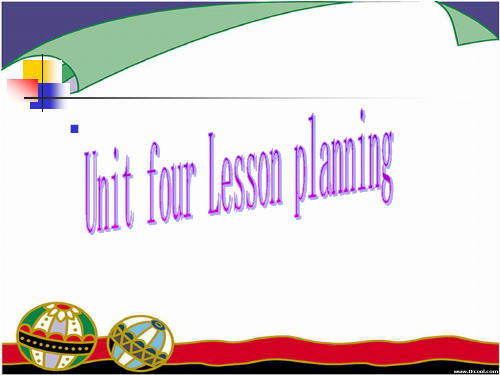
参考答案
1。出发点是好的,采取的方法简单粗暴,伤害学生自 尊心,引起逆反心理; 2。发现学生说话,先记下来,联系学生最近的表现综 合分析,找个合适的时间和地点(最好不在办公室) 以谈心的方式,与学生交流。 3.先请学生自己说说最近的表现,例如上课情况,作 业完成情况,值日等,让他自己给自己做个评价。 4.老师再评价, 首先肯定优点,再说不足,强调每个 孩子都有缺点,告诉学生因为对他喜爱和关心,对他 有更高的希望。 (尊重学生情感态度)
Principles for good lesson planning Aim Variety Flexibility Learnability Linkage
Aim
The realistic goals for the lesson. (三维目标:知识与技能,过程与方法,情感 态度与价值观 ) 课改:
The second period
1.
2.
3.
Questions for revision: What is a starter? What is the purpose of it? And the forms of it? PPP and P-W-P (form, meaning, structure, presentarion, practice, production, skill, pre-, while-, post) Controled practice(eg. Blank filling/ sentence writing/combination/substitution, guided practice eg. extension / summary writing etc.and free practice eg. Making up
英语教学法教程Unit 4 Lesson Planning
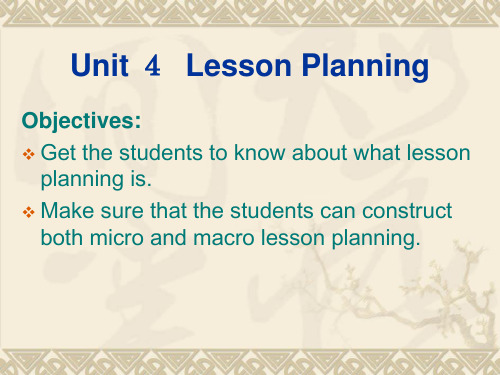
Macro planning involves the following:
1) Knowing about the profession: The teacher should get to know which language areas and language skills should be taught or practised in the course, what materials and teaching aids are available, and what methods and techniques can be used. 2) Knowing about the institution: The teacher should get to know the institution’s arrangements regarding time, length, frequency of lessons, physical conditions of classrooms, and exam requirements.
Benefits that teachers get from their teaching plan
1) To make the teacher aware of the aims and language contents of the lesson. 2) To help the teacher distinguish the various stages of a lesson and to see the relationship between them so that the lesson can move smoothly from one stage to another. 3) Proper lesson planning gives the teacher opportunity to anticipate potential problems that may arise in class so that they can be prepared with some possible solutions or other options for the lesson. 4) Lesson planning gives teachers, especially novice teachers, confidence in class.
Unit-4--Lesson-Planning

(usually lasts 40 or 50 minutes respectively).
第15页,共43页。
The relationship between macro and micro planning
第11页,共43页。
Flexibility
It means planning to use a number of different methods and techniques.
Learnability
It means the contents and tasks planned should be within the learning capability of the students .
In order to achieve the aims of the lesson, teachers need to think about:
1. The aims to be achieved
2. The materials to be covered 3. The activities to be organized 4. The techniques and resources to be used 5. How to make the lesson transit from one stage
❖ Knowing about the institution ❖ Knowing about the learners ❖ Knowing about the curriculum/syllabus ❖ Knowing about the objectives
英语教学法7LessonPlanning

II. Principles for good lesson planning
• Aim: the realistic goals for the lesson.
• Variety: different types of activities and a wide selection of materials.
• Linkage: the stages and steps are somehow liked with one another.
Ⅲ. Macro planning vs. micro planning.
• Lesson planning should be done at two levels:
Ⅰ. Why is lesson planning important?
• Lesson planning means making decisions in advance about what techniques, activities and materials will be used in the class.
Lesson planning
Macro planning vs. micro planning
What’s Macro planning?
• Macro planning is for over a longer period of time: a whole programme or a whole-years course.
Ⅳ. Components of a lesson plan
1) understanding the aims and language contents of the lesson;
Lesson 2 Lesson Planning
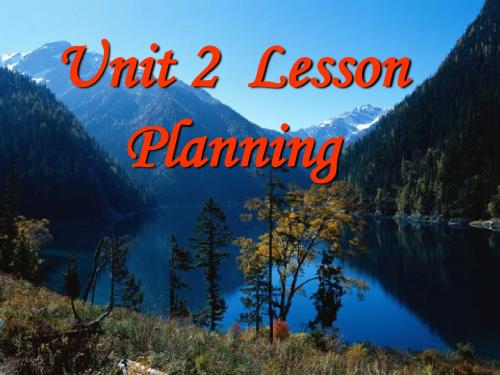
Question No. 4:
What are the factors which may influence your lesson planning?
Physical conditions
Class size, length of a lesson, time of the day, size of the classroom and insufficient teaching aids
What will it achieve?
How will students have changed as a result of the activity? (aims) e.g. It might give the students a greater understanding of an area of vocabulary. It might give them greater fluency in one particular topic area, or it might have the effect of providing students with better strategies for coping with long and difficult stories told orally.
A modified lesson plan can also provide a useful starting point the next time you teach students of a similar level. It enables the teacher to think clearly about what she hopes to achieve in the lesson and how the target will be met in the most appropriate and efficient way.
